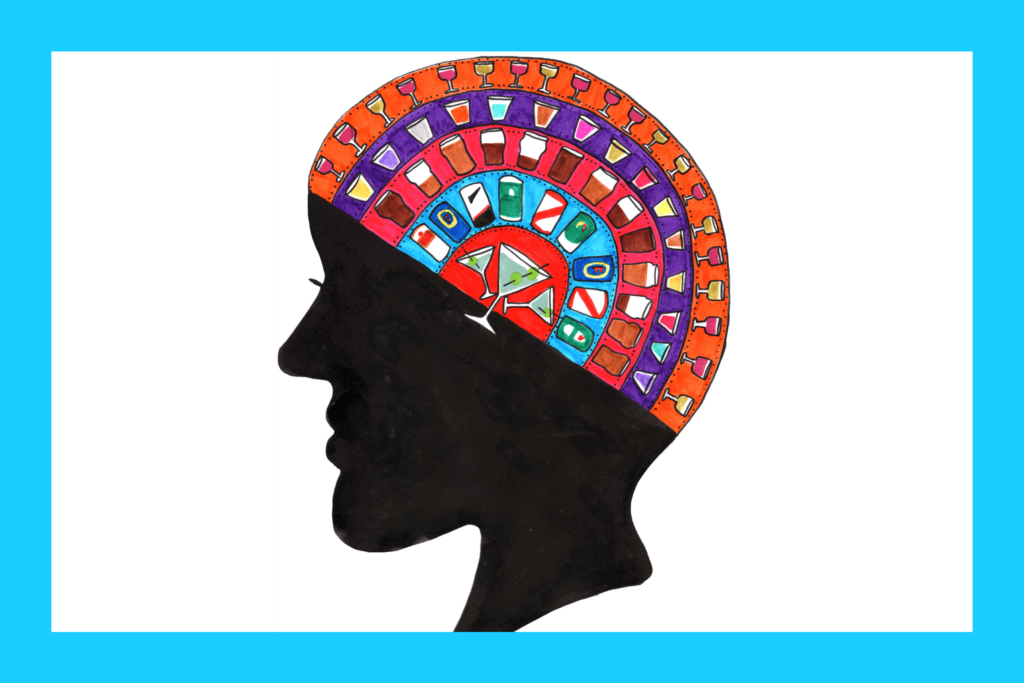Looking back on your drinking experiences at university, it might be difficult to recall a night out that didn’t begin with a bottle of bottom-shelf vodka or a sloppy round of beer pong. The next morning, you probably found yourself questioning those drunken hot takes you made in the smoking area the night before.
In light of the ingrained drinking culture of young people in the UK, we at Dry have spoken to two experts on the effects of alcohol, in order to investigate the real science behind binge drinking.
Binge drinking is defined by the NHS as “drinking lots of alcohol in a short space of time or drinking to get drunk”. It remains a prominent aspect of young people’s social lives, with 79% of students associating getting drunk as part of university culture, according to a 2018 survey. But binge drinking can have adverse effects, with impaired judgement leading to road accidents, assault, robberies and fights, among others.
According to Professor David Nutt, chair of neuropsychopharmacology at Imperial College London, this effect on perception is a result of increased Gamma Aminobutyric Acid [GABA] signalling in the brain when drunk. GABA is the neurotransmitter attributed to the calming effect of alcohol, while also promptly switching off the frontal cortex – the area of the brain responsible for self-control.
Wayne Hall, Emeritus Professor at the National Centre for Youth Substance Use Research in Queensland, Australia, agrees that the most immediate risks for young binge drinkers are their actions while intoxicated.
“Most of the health effects in young people are really around intoxication, the risks of injury and things of that sort,” he says. “We have a lot of health risks of long term heavy drinking, but they really don’t start to pop up until people have been at it for 10 or 15 years.”
Coupled with regrettable drunk actions is the feeling of dread, or ‘hangxiety’ that comes with them. This state of mind is exacerbated by drinking. “People often experience anxiety and depression in the comedown from alcohol. Heightened anxiety is a common symptom of alcohol withdrawal,” Hall explains.
When on holiday or at music festivals, many young people drink alcohol multiple days in a row, which can relieve any impending hangover effects. Hall compares it to the practice of some cannabis smokers, who rely on their vice for a decent night’s sleep. “Users can instantly relieve those symptoms by taking whatever their preferred drug is. They might not get euphoric effects, but they start to feel a lot better. Particularly with alcohol, which is why people talk about the hair of the dog,” he says.
Nutt also notes that when drinking multiple days in a row, the brain’s expectation of alcohol raises the body’s tolerance, thus requiring a greater number of drinks to become intoxicated.
Despite its similarities with other recreational drugs, alcohol is unique because of ease of access and lack of stigma. These factors give young people more opportunities to abuse it. “It’s usually a drug that’s used in a much wider variety of circumstances – people wouldn’t pull out a joint in a workplace and have a talk. But people often think nothing of having a drink at work, or at lunchtime,” Hall says.
Nutt agrees. He believes easy access to alcohol means its detrimental social effects reach a wider audience. “Nearly 80 percent of UK adults drink alcohol. This massive prevalence means that most families in the UK are affected by alcohol – either from members being dependent, or someone being harmed by someone who is drunk,” he says.
With the health-related effects of alcohol well documented, Hall thinks that addressing the social issues surrounding alcohol abuse may be a more constructive method of curbing binge drinking. “Some 20 years ago, we had a very effective drinking campaign here in Australia which focused on the social consequences rather than the medical ones, because those are the ones that people recognised both in their own drinking and in the drinking of friends,” he says.
Campaigns have also tended to focus on societal harm over health concerns because certain alcohol-related conditions have been found to be reversible in young people, including fatty liver disease, which can lead to cancer. Nutt emphasises that young binge drinkers are still prone to many health risks.
“Some conditions such as fatty liver disease and hypertension can reverse. However, the damage caused by strokes, heart attacks, brain injury and cancer cannot be undone,” he says. Similarly, Hall is keen to remind young people about the accumulating risks of abusing alcohol. “Young binge drinkers often pay the price in their 30s or 40s, that’s when many of these health problems start to raise their hands,” he says.
However, before these physical problems can manifest, young people may experience the effects of alcohol addiction. Nutt explains that the more a substance is ingested, the more radical changes are initiated by the brain to maintain normal function. These adaptations may lead to dependency on the substance to function normally. “The bigger the peak effect of any drug, the more likely the user is to become addicted,” he says.
Addressing how young people can approach cutting down on their drinking habits, Nutt suggests keeping a log to be more mindful of how many units you consume on a night out, as well as making sure every drink is worthwhile. For example, you might prefer to have a long lasting beer over a shot of tequila.
On the topic of drinking for pleasure, Nutt is currently developing an active ingredient known as Alcarelle, which interacts with the GABA system and induces a similar calming sensation to alcohol, without the damaging side effects.
“We have a prototype that will begin testing soon. Once it has passed food safety testing, our vision is to licence it to drinks manufacturers for them to make their own flavoured drinks from it.”
Hall asserts that those who drink a lot and wish to stop should seek medical advice beforehand, to prevent going into instant withdrawal. “If people have been drinking very heavily and abruptly stop, they may develop delirium tremens, a potentially serious condition that needs medical treatment,” he says. Hall also recommends cutting down on time spent in a drinking setting with friends who may be particularly fond of alcohol,
Finally, on non-alcoholic drinks such as Alcarelle and various Lo & No beers, Hall approves of such innovations. “Those are all reasonably healthy things that normalise non-drinking, as well as more conscious drinking, enabling people to discover that you can have a good time without getting off your face.”
Illustration: Amy-Rose Holland, Picture editor: Charlotte Doyle

